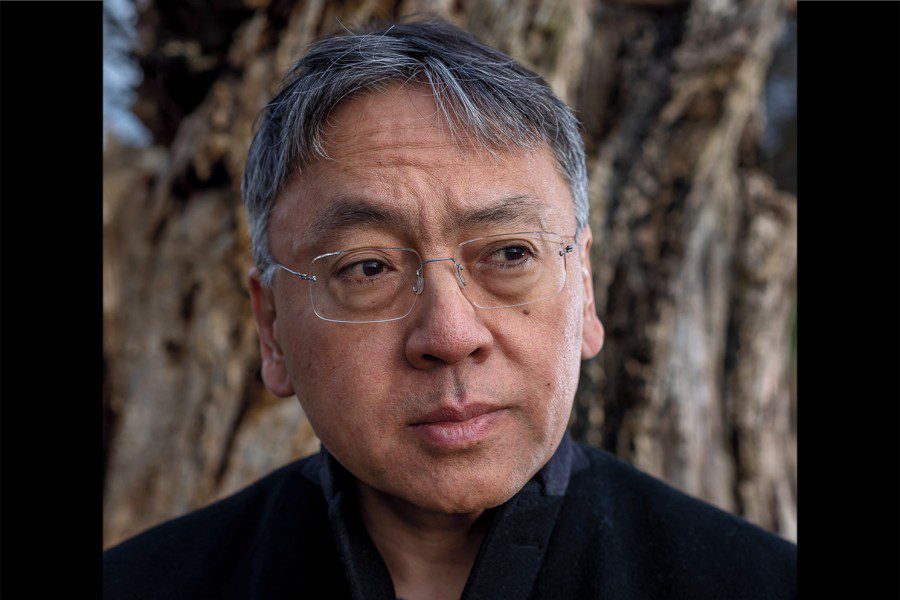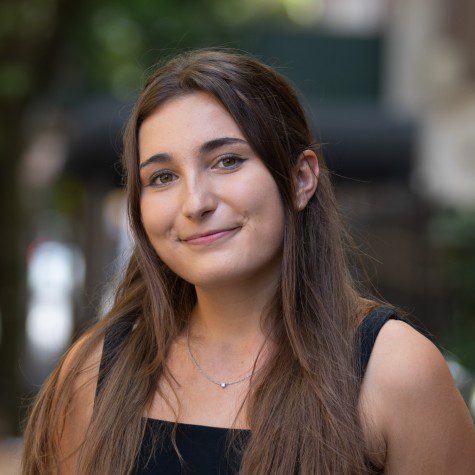Q&A: Kazuo Ishiguro on Joni Mitchell, ‘War and Peace’ and the future of storytelling
Kazuo Ishiguro, author of the 2022-23 NYU Reads novel “Klara and the Sun,” speaks about family, storytelling and the ever-changing world. (Photo by Andrew Testa)
October 4, 2022
Kazuo Ishiguro — winner of the 2017 Nobel Prize in Literature — is an author, musician and screenwriter who was born in Nagasaki, Japan, and raised in Britain. From “The Remains of the Day,” a novel about a butler in posh Oxford, England, to “Never Let Me Go,” a work of sci-fi involving love and cloning, Ishiguro’s literary scope is both broad and constantly evolving.
Ishiguro’s latest novel, “Klara and the Sun,” was this year’s NYU Reads selection — a book chosen by a committee of students, faculty and administrators to offer the university community a collective reading experience. The novel, which is narrated by an artificial intelligence robot named Klara, was longlisted for the 2022 Carnegie Medal in Fiction and the 2021 Booker Prize. Klara’s interactions with her human counterparts and the understanding she develops about her surroundings prompt ethical questions and philosophical concerns about rapidly-developing AI technology in the world today.
After speaking about the novel with Interim Provost Georgina Dopico and a panel of three creative writing students during an NYU Reads event on Sept. 29, Ishiguro sat down with WSN to discuss the music he currently has on repeat, the fundamental flaw of an infamous classic novel, and how he believes younger generations can contribute to the rapidly evolving art form of storytelling.
This interview has been edited for length and clarity.
WSN: What do you see as the future of storytelling?
Ishiguro: However messy this world gets and however divided we get, stories are a force for good. It’s very important that each generation comes up with the writers who can address the world as it has become. It seems to me that we do live in a very divided world. I would like to believe that by continuing to write and share stories, we’re a counterforce to that.
WSN: How do you think stories and storytelling are able to serve as that counterforce, addressing the division that you see in the world today?
Ishiguro: Stories are particularly important because they’re not just exchanges of information. When we tell each other stories, we are exchanging emotions and how it feels to be in certain situations. We build empathy. Even if somebody’s point seems very alien to us, it’s very important to understand where people are coming from emotionally and at the human level.
When we have divisions that are so obvious in the world at the moment, we have to be careful when we create stories that arouse emotion to make sure that there is some relationship to the truth. We have to guard against manipulation to arouse emotions one way or another, emotions that aren’t earned. And for this reason, it’s very important that we remain critical of our movies, of our books, of our TV shows — they have to do much more than just entertain us or sway us or make us cry. We have to keep asking ourselves, “Are they just manipulating us or is this a genuine statement about some aspect of human existence?”
Ishiguro’s daughter, Naomi, offers him an inside look into this evolving field of storytelling. The 30-year-old author of two works — the novel “Common Ground” and the short story collection, “Escape Routes” — received a Master’s degree from the University of East Anglia’s creative writing program, following in her father’s footsteps. In past interviews, Ishiguro has shared the profound impact that fatherhood has had on his life and on his creative work.
WSN: What is it like watching someone of your daughter’s generation navigate the world of literature as you continue to do the same? What are the biggest lessons that you have taught each other along the way?
Ishiguro: I’ve always learned a lot from my daughter simply because she’s of a younger generation. Being persuaded to be enthusiastic about the kind of the films and TV shows and music that she was enthusiastic about has taught me a lot. She writes in a very different way, and there are many things that she does that I can’t do. Even technically, she tends not to use first person, and she uses a different kind of technique, and that’s very interesting.
But also I suppose the preoccupations and the emphases and the priorities of somebody of her generation are different to mine. I find it very valuable to see how a younger generation goes about things and what worries them, what makes them happy, what reassures them and what keeps them up at night.
WSN: What are those worries and preoccupations?
Ishiguro: The obvious thing is that compared to my generation, climate change has become a much bigger concern. We worried about things like pollution, things like that, but we were concerned about nuclear war, the Cold War, fascism. For her generation and for your generation, climate change is the huge challenge. It’s such a complicated and complex question that goes into every aspect of how the world is run at the personal and at the big political and geopolitical levels. Obviously that’s something that concerns my generation, but we won’t be around that much longer, and it’s rightfully something that I think the younger generation has to debate and discuss.
Music has always had a profound impact on Ishiguro’s work, and in fact, he once wanted to become a songwriter himself. Although he hasn’t made music his full-time career, he has co-written several songs with jazz musician Stacey Kent and her husband, saxophonist Jim Tomlinson.
Bob Dylan, Tom Waits and Nina Simone are among the many artists he cites as inspirations, though lately, Ishiguro has been listening to mainly jazz. West coast jazz musician Charlie Haden’s albums — specifically 1996’s “Now is the Hour” — and country-folk singer Gillian Welch have been on repeat in the author’s London home. “For me, she is the most important singer-songwriter to emerge in the last 25 years or so,” he said of Welch, citing her “stunning songs” and “incredible songwriting.”
Ishiguro also said that “old classics” by Miles Davis, Bill Evans, and Joni Mitchell have also made a resurgence in his playlists. He added that Mitchell’s music has been resonating more with him now than it ever had in the past.
WSN: Why is Joni Mitchell resonating with you more now? Is it the lyrics? Something else?
Ishiguro: When I first started to listen to Joni Mitchell in the 1970s, I was looking much more at her lyrics and I probably didn’t relate to them as much as I related to people like Leonard Cohen or Bob Dylan. I understand now that she’s a more abstract kind of artist, and that the music is possibly much more important in the mix. She’s quite an avant-garde artist, and I particularly like the albums that she produced when she was crossing over from folk music into jazz music, so “Court and Spark,” and in particular, now we’ve got “Hejira.” I listen to it over and over again.
For me, “Hejira” is her great album. I understand her much better at that juncture of music and lyrics. I’m not just looking at lyrics with music backing them. She is a great musician and great composer, and she really pushed the boundaries. She was ahead of her time, as they say. It’s a cliché, but it was true in the case of those crossover albums between folk rock and jazz that she created.
Ishiguro also has an affinity — as would be expected — for great works of literature. In a piece for O, The Oprah Magazine, he revealed his love for Charlotte Brontë’s “Villette” and called Cormac McCarthy’s Western frontier novel “Blood Meridian” a “monumental work of art.” He also pointed to Haruki Murakami’s “South of the Border, West of the Sun” and David Mitchell’s “Ghostwritten” as influential to his life and work.
Although Ishiguro said that he’s “not really a person to ask” for contemporary book recommendations — explaining that he does not read much beyond nonfiction nowadays — he offered a few suggestions. He said that one of Fyodor Dostoevsky’s lesser-known works called “The Devils” handles terrorism and the people who involve themselves in terrorist cells in a way that he feels “speaks to now.” He also shared some insight as to what’s been on his bookshelves as of late.
WSN: What’s the last great book that you read?
Ishiguro: It’s really hard to say about great books. I often reread old classics. Because I was locked down during the pandemic, I thought it was a good opportunity to reread “War and Peace” because it is so long, you don’t usually read it. It’s a great book with many flaws, but that was probably the last great book I read. Its fundamental flaw is that with this huge cast of characters spreading 1,000-plus pages, the characters are taken from such a narrow sector of society. They’re all aristocrats and the female characters are very weak.
WSN: What are you reading now?
Ishiguro: Of contemporary writers, there’s an Argentinian woman called Mariana Enríquez who writes interesting Gothic horror stories. She is very good indeed — I really liked her first two collections of short stories. They translated very well into English, and I’m very excited that she’s just produced her first novel available in English. I think she’s a very interesting writer and she is quite hard to pigeonhole. It’s also intertwined concerns about recent Argentinian history, about the military juntas and people who have disappeared and what effect that has had on Argentinian people. She does it through this kind of South American Gothic horror.
While plans have not been announced for a successor to “Klara and the Sun,” Ishiguro wrote the screenplay for “Living,” a 2022 British drama which is set to be shown at the American Film Institute Fest in November. Premiered at the 2022 Sundance Film Festival in January, the film is an adaptation of the 1956 Japanese drama film “Ikiru” — which is an adaptation of Leo Tolstoy’s novel, “The Death of Ivan Ilyich.”
Contact Abby Wilson at [email protected].




























































































































































